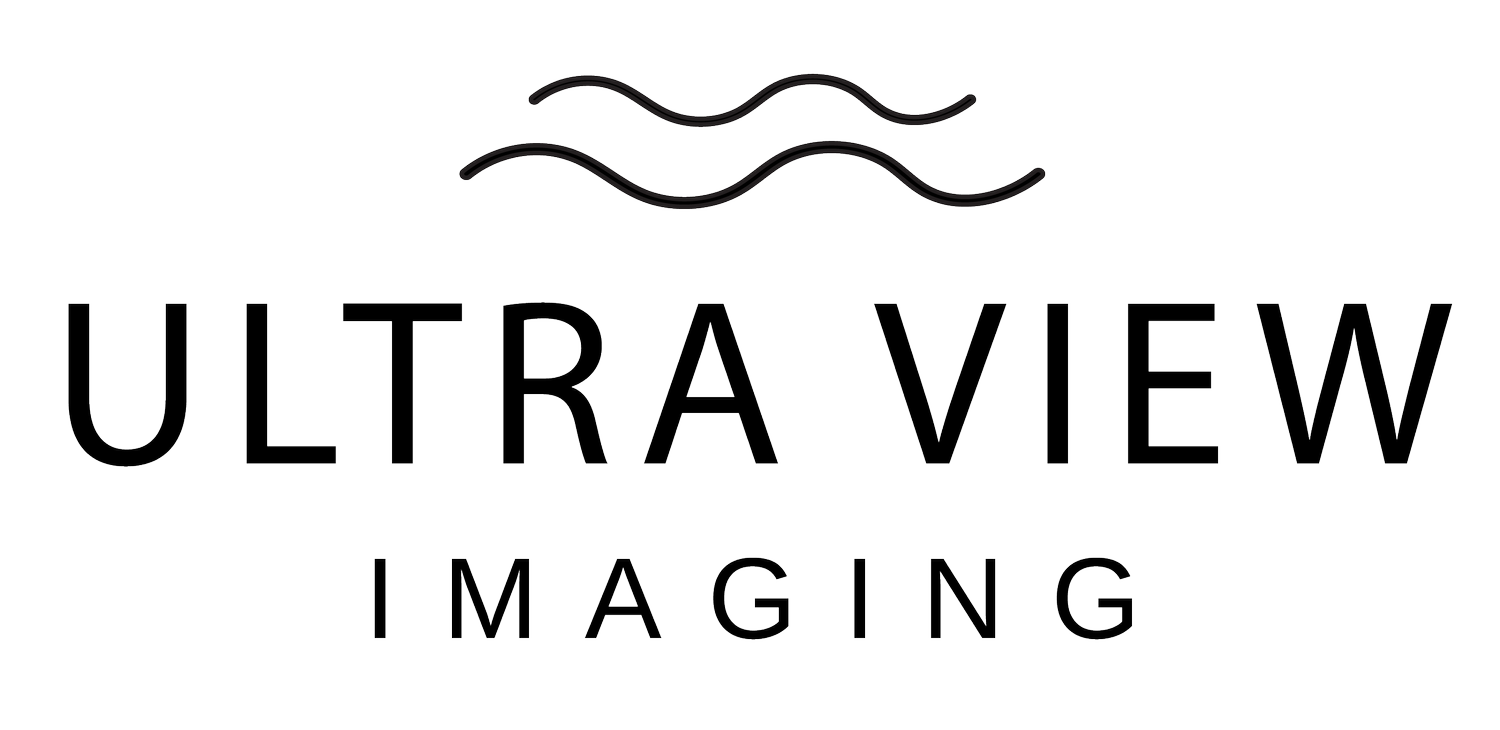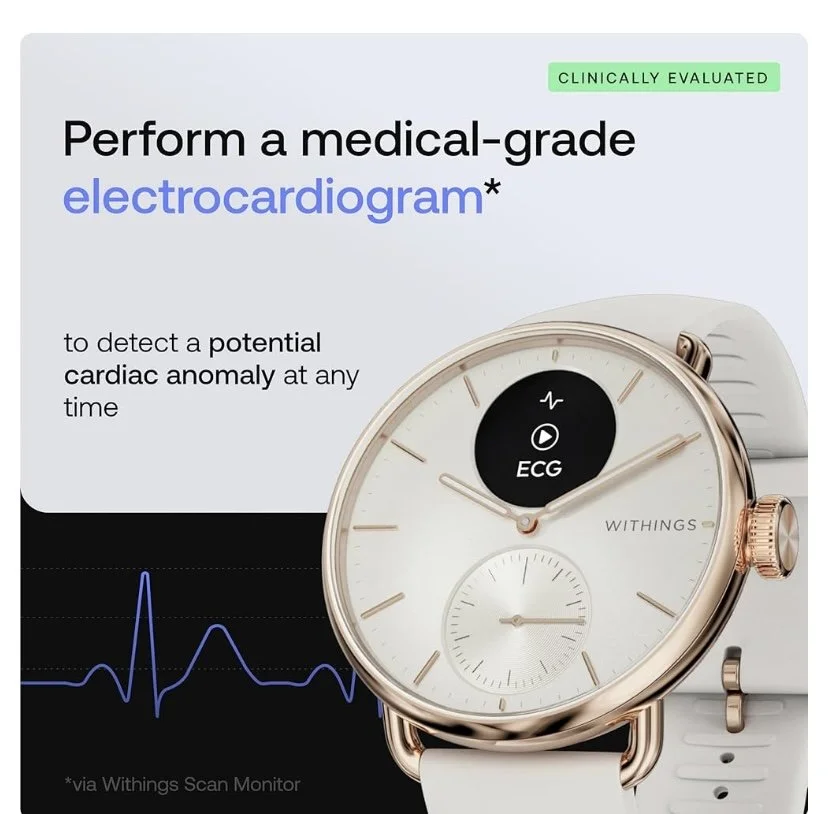The Smartwatch That Could Save Your Life: Detecting AFib, Sleep Apnea & More with FDA-Cleared Tech
Looking for the best smartwatch to monitor your heart health? Discover the top wearable tech devices that detect atrial fibrillation (AFib), track blood oxygen levels (SpO2), and even screen for signs of sleep apnea. As a cardiac sonographer, I break down the most accurate and clinically relevant smartwatches—including the FDA-cleared Withings ScanWatch—so you can make an informed decision about your health. Whether you’re managing a condition or staying proactive, this guide compares the best ECG smartwatches of 2025 with links to shop.
The Smartwatch That Could Save Your Life
We’re way past counting steps.
Today’s smartest watches do more than track your movement—they track your health in ways that could truly save your life.
As a cardiac sonographer, I’ve seen what happens when serious conditions like atrial fibrillation (AFib) go undetected. Often, the first symptom isn’t palpitations—it’s a stroke. And sleep apnea, which many people still overlook, can silently increase your risk of high blood pressure, heart failure, and even sudden cardiac death.
But here’s the good news: The right smartwatch can help detect these conditions early.
If you're looking for the best smartwatch for heart health, AFib detection, or even sleep apnea awareness, I’ve got you covered. Below is a breakdown of the top smartwatches with ECG and oxygen sensors—and why one in particular stands above the rest.
Withings ScanWatch – Best Overall for Clinical Monitoring
If you want the most medical-grade option on the market, this is it.
The Withings ScanWatch is the only smartwatch on this list with FDA-cleared biosensors, meaning it meets clinical standards for detecting AFib and measuring oxygen levels.
Why I Recommend It:
- FDA-cleared ECG for detecting irregular heart rhythms like AFib
- SpO2 monitoring to track oxygen saturation—especially helpful for identifying sleep apnea risks
- Breathing disturbance detection while you sleep
- 30-day battery life (yes, really)
- HSA/FSA eligible
- Subtle, analog-meets-digital design that doesn’t scream 'medical device'
Apple Watch Series 9 – Best for iPhone Users
Apple is still one of the leaders when it comes to real-time health alerts. If you’re already in the Apple ecosystem, this is a strong contender—especially with its FDA-cleared ECG app.
What It Does Well:
- On-demand ECG with instant analysis
- Irregular rhythm notifications for AFib detection
- SpO2 tracking and advanced sleep monitoring
- Integrates seamlessly with Apple Health
- Additional features like fall detection and emergency SOS
Drawbacks:
- Battery life is only about 18 hours
- Not HSA/FSA eligible
- Requires daily charging (which can be a dealbreaker for consistent tracking)
Samsung Galaxy Watch6 – Best for Android Users
Samsung stepped up its health tracking game with the Galaxy Watch6, especially for Android users. While not FDA-cleared in all regions, it includes ECG functionality via the Samsung Health Monitor app.
Key Features:
- ECG readings for heart rhythm monitoring
- SpO2 and sleep tracking, including blood oxygen trends
- Sleek, sporty design
- Great for fitness tracking + cardiac insights
Things to Know:
- ECG access varies by region and phone compatibility
- Battery lasts up to 40 hours—better than Apple, but not quite Withings-level
Fitbit Sense 2 – Best for Wellness on a Budget
If you’re just starting to monitor your health and want something more affordable, the Fitbit Sense 2 offers great value. It’s not as clinically robust as the others, but it still gives insight into your heart and oxygen levels.
What You Get:
- ECG app for heart rhythm snapshots
- SpO2 tracking during sleep
- Stress management tools and guided breathing
- Battery life up to 6+ days
- Budget-friendly option for casual users
Limitations:
- Not FDA-cleared
- Less accuracy compared to medical-grade options
- Not HSA/FSA eligible
Why Watches Like These Matter
When we talk about “wearable health tech,” we’re not talking about gimmicks. These are early warning tools that can flag problems before symptoms appear—and potentially prevent serious outcomes.
Conditions to Watch For:
- Atrial Fibrillation (AFib): Can lead to stroke or heart failure if undiagnosed
- Sleep Apnea: Often unnoticed but increases cardiac risk
- Low SpO2: May signal respiratory dysfunction or cardiovascular stress
How to Choose the Best Health-Focused Smartwatch
Before buying, ask:
- Does it offer ECG functionality?
- Is the SpO2 data continuous or spot-check only?
- Is it FDA-cleared or clinically validated?
- Is it compatible with your phone?
- Is it eligible for FSA/HSA reimbursement?
- Will the battery life support consistent use?
Final Thoughts
A smartwatch can’t replace medical imaging or a full workup—but it can absolutely start the conversation. It can prompt a visit. It can raise a red flag. It can get you off a path toward an almost inevitable health disaster.
As a cardiac sonographer, I believe in early detection and proactive care. These tools won’t diagnose you—but they can be the nudge that leads you to the right care at the right time.
Because sometimes, catching something early makes all the difference.
Affiliate Disclosure
This post contains affiliate links. I may earn a commission from qualifying purchases, at no additional cost to you. I only recommend products I’ve personally researched and trust.
When Should a Practice Order an Echocardiogram?
Not sure when to order an echocardiogram? Learn the key signs—like shortness of breath, palpitations, or murmurs—that indicate a patient may need one. Plus, discover how mobile ultrasound can streamline diagnostics and improve patient care at your practice.
Echocardiograms are a crucial tool in diagnosing and monitoring heart conditions, but many primary care providers and specialists wonder: When is the right time to order one?
At Ultra View Imaging, we provide on-site mobile echocardiograms, making it easier than ever for practices to offer this essential test without sending patients elsewhere. Here’s when you should consider ordering an echocardiogram for your patients.
1. Unexplained Shortness of Breath or Fatigue
If a patient reports difficulty breathing, excessive fatigue, or exercise intolerance, an echocardiogram can help determine if heart failure, valve disease, or other cardiac dysfunctions are the cause.
2. Irregular Heartbeats or Palpitations
Frequent palpitations or irregular rhythms could be a sign of atrial fibrillation, arrhythmias, or structural abnormalities. An echocardiogram can assess the heart’s function and structure to guide treatment.
3. Heart Murmurs or Suspected Valve Disease
A new or changing heart murmur should always be evaluated with an echocardiogram to check for valvular stenosis, regurgitation, or congenital defects. Early detection can prevent complications down the line.
4. History of Hypertension or Stroke
Patients with long-term high blood pressure or a history of stroke may need an echocardiogram to assess left ventricular function, hypertrophy, or potential embolic sources that could increase their risk of future events.
5. Chest Pain or Suspected Coronary Artery Disease
While an echocardiogram doesn’t directly visualize coronary arteries, it can assess for wall motion abnormalities, ejection fraction, and other indicators of ischemia or past heart attacks.
6. Preoperative Cardiac Risk Assessment
Patients undergoing major surgery, especially those with existing risk factors, may need a preoperative echocardiogram to assess cardiac function and potential surgical risks.
How Mobile Echocardiograms Improve Patient Care
Traditionally, referring a patient for an echocardiogram can lead to:
❌ Delays in scheduling
❌ Longer wait times for results
❌ Decreased patient compliance
With Ultra View Imaging’s mobile echocardiogram services, your practice can:
✅ Perform tests on-site with no equipment investment
✅ Get results faster, improving patient care and treatment planning
✅ Keep revenue within your practice instead of referring it out
Let’s Bring Mobile Ultrasound to Your Practice
If your practice regularly orders echocardiograms, why send patients elsewhere? Our expert sonographers bring the test to you—seamlessly, affordably, and efficiently.
📩 Contact us today to learn how mobile ultrasound can transform your patient care



